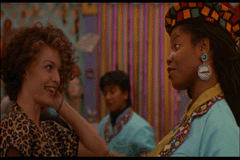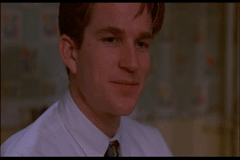|
Newest Reviews:
New Movies -
The Tunnel
V/H/S
The Tall Man
Mama Africa
Detention
Brake
Ted
Tomboy
Brownian Movement
Last Ride
[Rec]³: Genesis
Hara-Kiri: Death of a Samurai
Indie Game: The Movie
Abraham Lincoln: Vampire Hunter
Old Movies -
Touki Bouki: The Journey of the Hyena
Drums Along the Mohawk
The Chase
The Heiress
Show
People
The Strange Affair of Uncle Harry
Pitfall
Driftwood
Miracle Mile
The Great Flamarion
Dark Habits
Archives -
Recap: 2000,
2001, 2002,
2003, 2004
, 2005, 2006,
2007 , 2008
, 2009 ,
2010 , 2011 ,
2012
All reviews alphabetically
All reviews by star rating
All reviews by release year
Masterpieces
Screening Log
Links
FAQ
E-mail me
HOME
| |
Married to the Mob (Jonathan Demme) 1988
 Jonathan Demme’s Married
to the Mob strikes me as the best of his 80’s comedies. It’s probably
also the most crass of them (odd, since it is the last one he produced), but I
think its crudeness works to its advantage. The three comedies that Demme made
in that decade (including this, Melvin and
Howard, and Something Wild) show a
director that was able to address serious concerns well before the nineties saw
him become a “serious” director (making Beloved
and Philadelphia). I wouldn’t want
to suggest Married to the Mob is in
any way a serious movie. It’s a completely, wonderfully frivolous exercise,
that happens to be capable of spinning the sense of a threat into itself. The
mob is mostly played for jokes here, but that doesn’t make the movie’s
gangsters feel much less dangerous than those in The
Godfather. Certainly, there seems to be a lot more at stake, both
emotionally and physically, than in the tepid Analyze This. The way that Demme brilliantly used fragments of
African American music and culture to suggest an energy that awaits those who
are willing to step to the side of their humdrum existence in Something
Wild, which had no black main characters,
is repeated here. That sort of positive stereotyping is probably a good part
of the reason he eventually found himself mounting Oprah’s production of Beloved.
Jonathan Demme’s Married
to the Mob strikes me as the best of his 80’s comedies. It’s probably
also the most crass of them (odd, since it is the last one he produced), but I
think its crudeness works to its advantage. The three comedies that Demme made
in that decade (including this, Melvin and
Howard, and Something Wild) show a
director that was able to address serious concerns well before the nineties saw
him become a “serious” director (making Beloved
and Philadelphia). I wouldn’t want
to suggest Married to the Mob is in
any way a serious movie. It’s a completely, wonderfully frivolous exercise,
that happens to be capable of spinning the sense of a threat into itself. The
mob is mostly played for jokes here, but that doesn’t make the movie’s
gangsters feel much less dangerous than those in The
Godfather. Certainly, there seems to be a lot more at stake, both
emotionally and physically, than in the tepid Analyze This. The way that Demme brilliantly used fragments of
African American music and culture to suggest an energy that awaits those who
are willing to step to the side of their humdrum existence in Something
Wild, which had no black main characters,
is repeated here. That sort of positive stereotyping is probably a good part
of the reason he eventually found himself mounting Oprah’s production of Beloved.
 As I mentioned before, most of Married to the Mob doesn’t have a lot to overtly say, however. The
story is a relatively pedestrian chronicle of mob wife Angela DeMarco’s
(Michelle Pfeiffer) journey toward independence, but there are few moments that
feel stupidly manipulative. Much of the film’s satiric edge sends up even her
attempts to gain freedom, which she apparently defines as gathering an
amalgamation of trinkets that she hopes will lend definition to her life. The
film’s art direction is more integral than usual here, since Angela starts out
in a world that’s filled with plenty of money and plenty of bad taste, but
causes her to exclaim, “everything we own fell off of a truck!” The way that
the movie equates possessions with self-worth is rock-solid commentary on 80’s
consumerism. This needling of the need to accumulate is roughly the same theme
that fueled Melvin and Howard, but it
feels as if it’s been made much less explicit and more relaxed here, and that
easygoing attitude helps the comedy along. Still, the greatest assets in the
film might be the universally solid performances that Demme gets from his
actors. In my estimation, the standout is Matthew Modine, who makes his FBI
agent a completely affable dork. That he, who seems to be in another movie
entirely (think classic screwball comedy) than the rest of the cast, emerges as
the romantic lead is as surprising as it is inevitable. Solid turns from
Pfeiffer, Dean Stockwell, Mercedes Ruehl (who is like a live action Miss Piggy),
and even Alec Baldwin round out the cast.
As I mentioned before, most of Married to the Mob doesn’t have a lot to overtly say, however. The
story is a relatively pedestrian chronicle of mob wife Angela DeMarco’s
(Michelle Pfeiffer) journey toward independence, but there are few moments that
feel stupidly manipulative. Much of the film’s satiric edge sends up even her
attempts to gain freedom, which she apparently defines as gathering an
amalgamation of trinkets that she hopes will lend definition to her life. The
film’s art direction is more integral than usual here, since Angela starts out
in a world that’s filled with plenty of money and plenty of bad taste, but
causes her to exclaim, “everything we own fell off of a truck!” The way that
the movie equates possessions with self-worth is rock-solid commentary on 80’s
consumerism. This needling of the need to accumulate is roughly the same theme
that fueled Melvin and Howard, but it
feels as if it’s been made much less explicit and more relaxed here, and that
easygoing attitude helps the comedy along. Still, the greatest assets in the
film might be the universally solid performances that Demme gets from his
actors. In my estimation, the standout is Matthew Modine, who makes his FBI
agent a completely affable dork. That he, who seems to be in another movie
entirely (think classic screwball comedy) than the rest of the cast, emerges as
the romantic lead is as surprising as it is inevitable. Solid turns from
Pfeiffer, Dean Stockwell, Mercedes Ruehl (who is like a live action Miss Piggy),
and even Alec Baldwin round out the cast.
* * * 1/2
01-02-01
Jeremy Heilman
|